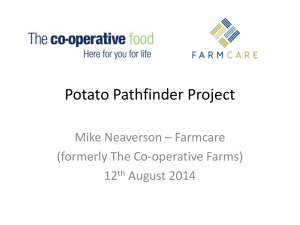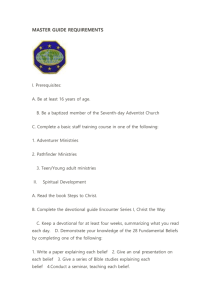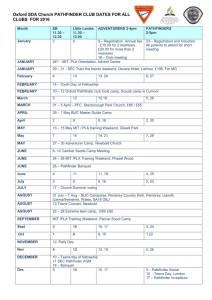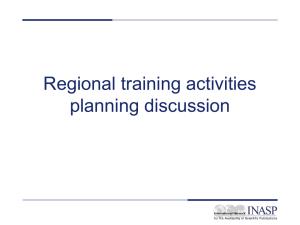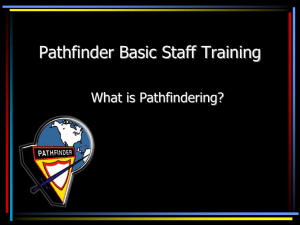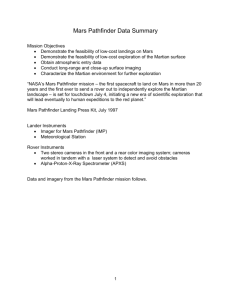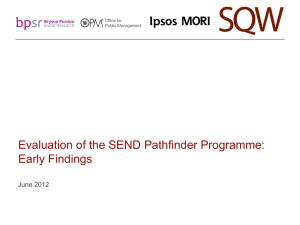Summary of OA Good Practice Pathfinder Outputs
advertisement
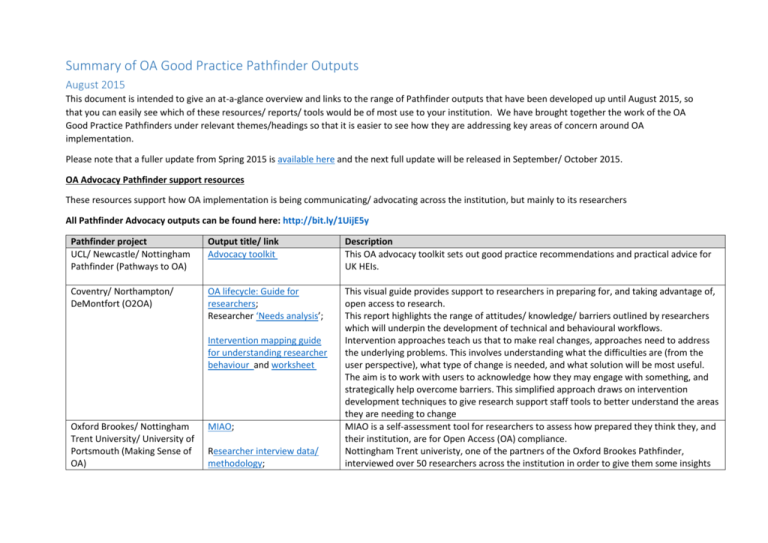
Summary of OA Good Practice Pathfinder Outputs August 2015 This document is intended to give an at-a-glance overview and links to the range of Pathfinder outputs that have been developed up until August 2015, so that you can easily see which of these resources/ reports/ tools would be of most use to your institution. We have brought together the work of the OA Good Practice Pathfinders under relevant themes/headings so that it is easier to see how they are addressing key areas of concern around OA implementation. Please note that a fuller update from Spring 2015 is available here and the next full update will be released in September/ October 2015. OA Advocacy Pathfinder support resources These resources support how OA implementation is being communicating/ advocating across the institution, but mainly to its researchers All Pathfinder Advocacy outputs can be found here: http://bit.ly/1UijE5y Pathfinder project UCL/ Newcastle/ Nottingham Pathfinder (Pathways to OA) Output title/ link Advocacy toolkit Description This OA advocacy toolkit sets out good practice recommendations and practical advice for UK HEIs. Coventry/ Northampton/ DeMontfort (O2OA) OA lifecycle: Guide for researchers; Researcher ‘Needs analysis’; This visual guide provides support to researchers in preparing for, and taking advantage of, open access to research. This report highlights the range of attitudes/ knowledge/ barriers outlined by researchers which will underpin the development of technical and behavioural workflows. Intervention approaches teach us that to make real changes, approaches need to address the underlying problems. This involves understanding what the difficulties are (from the user perspective), what type of change is needed, and what solution will be most useful. The aim is to work with users to acknowledge how they may engage with something, and strategically help overcome barriers. This simplified approach draws on intervention development techniques to give research support staff tools to better understand the areas they are needing to change MIAO is a self-assessment tool for researchers to assess how prepared they think they, and their institution, are for Open Access (OA) compliance. Nottingham Trent univeristy, one of the partners of the Oxford Brookes Pathfinder, interviewed over 50 researchers across the institution in order to give them some insights Intervention mapping guide for understanding researcher behaviour and worksheet Oxford Brookes/ Nottingham Trent University/ University of Portsmouth (Making Sense of OA) MIAO; Researcher interview data/ methodology; Portsmouth REF poster Edinburgh/ Heriot-Watt/ St Andrews (LOCH) case studies, templates into how researchers viewed and were responding to OA funder mandates. Results from the research behaviour analysis were coded in order to identify trends, which could be built on through enhanced advocacy work. University of Portsmouth, one of the partners of the Oxford Brookes Pathfinder project, was one the first Pathfinder institutions to adapt the HEFCE guidance to suit local workflows College of Medicine and Veterinary Medicine Open Access Implementation Case Study: Communication Planning - Exemplar Emails: College of Medicine School of Mathematics Open Access and REF in Humanities & Social Sciences: Example School OA Plan OA Facilitator Job Description OA Structural Workflows These resources support the processes/ workflows/ lifecycles related to the implementation of OA across the institution All Pathfinder workflow outputs can be found here: http://bit.ly/1MI0DIp Pathfinder project Manchester/ Edge Hill/ Salford/ Liverpool/ John Moores (opeNWorks) Output title/ link Case studies Toolkit (coming soon) Hull/ Lincoln/ Huddersfield (HHuLOA) Northumbria/ Sunderland: OA Lifecycle Glasgow/ Lancaster/ Southampton/ Kent (E2EOA) Lancaster OA workflows Case studies Description These case studies provide a baseline level of Open Access (OA) activity at each of the opeNWorks project universities (Manchester, Edge Hill, Liverpool, Salford and John Moores) during the period 2013-14 based on set criteria, eg, number of staff supporting OA, number of deposits in the institutional repository, number of article processing charges (APCs) paid. This toolkit will be designed to meet the needs of institutions with limited resource as they prepare to support the implementation of the HEFCE Open Access policy This visualisation diagram gives a comprehensive matching of Jisc and above campus OA services against institutional workflows This is a series of case studies highlighting OA good practice in four HEIs with a range of different backgrounds. Each case study will focus on progress towards OA implementation across five broad areas: Costs; Structure and Workflows; Institutional Policy and Strategy; Advocacy, training and awareness; Systems and compliance This blog post outlines how Lancaster University has made changes to its workflows as a result of the E2EOA project so far. Edinburgh/ Heriot-Watt/ St Andrews (LOCH) St Andrews Lean case study This case study looks at the Lean Exercise undertaken by the Open Access and Research Publications Support Team at St Andrews last year. OA Cost Management These outputs relate to the approaches projects have taken to managing costs related to the management of OA implementation. All Pathfinder cost management outputs can be found here: http://bit.ly/1E4wIlJ Pathfinder project Bath/ Bristol/ Exeter/ Cardiff (GW4) Output title/ link Functional Cost Analysis report Northumbria/ Sunderland APC Cost Modelling tool Bath/ Bristol/ Exeter/ Cardiff (GW4) Guide to using credit cards, Description This is an analysis of the administrative costs of processing APC payments in the four universities of the GW4 alliance: Bath, Bristol, Cardiff and Exeter. Functional Cost Analysis (FCA) methodology was used to investigate labour costs per APC payment and identify resource intensive functions with a view to later improvement. This tool is intended to help establish an internal business case to set up an APC fund for Open Access publishing. It allows you to model different cost projections based on variables such as FTE, number of articles, REF submission targets, and % Green vs Gold OA. This guide is intended for institutions that are considering (or currently using) purchase cards for APC payment. The guide outlines some of the benefits and issues around card use. Open Access Reporting Checklist This checklist is intended to assist institutions in identifying data required for OA reporting to Jisc for RCUK (APC spreadsheet) and HEFCE for REF OA. Sample APC Payment Workflows; Mapping workflows at the four collaborating institutions identified a generic series of ‘steps’ in each payment scenario used by each institution. This led to the development of sample workflows for each payment method which it is hoped will provide a useful aid for institutions developing new, or adapting old, workflows. Institutions may need to adapt the sample workflows to suit their own requirements, systems and processes. FAQs for Publishers; These ‘FAQs for publishers’ are intended to assist publishers in processing APC payments for Gold Open Access on behalf of authors and their institutions. It is hoped they will provide answers to commonly recurring questions, explain issues and promote understanding between all parties involved in APC payments. OA Policy and Baselining These outputs relate to how institutions can capture and baseline information on all aspects of open access activity that may be taking place within institutions and thereby identify areas where more work needs to be done to support OA implementation. All Pathfinder workflow outputs can be found here: http://bit.ly/1DmKFAF Pathfinder project Hull/ Lincoln/ Huddersfield (HHuLOA) Output title/ link Funder policy mapping Description This tool aims to aid navigation of the OA policy landscape, to inform OA practitioners and researchers. Oxford Brookes/ Nottingham Trent University/ University of Portsmouth (Making Sense of OA) Hull/ Lincoln/ Huddersfield (HHuLOA) CIAO ; ‘CIAO (Collaborative Institutional Assessment of Open access) is a benchmarking tool for assessing institutional readiness for Open Access (OA) compliance Baselining Tool This baselining tool helps institutions map their current OA activity as a way of identifying areas that require attention, and also to highlight where there has been progress as we move towards April 2016. All institutions are invited to fill in their data/ information. UCL/ Newcastle/ Nottingham Pathfinder (Pathways to OA) Baselining report This report surveys OA implementation across all partner institutions (UCL, Newcastle and Nottingham) and identifies that despite their differences in size, research focus and open access infrastructure, all encountered extremely similar issues and challenges with delivering compliance with funders’ open access policies. OA Systems and metadata These resources relate to how projects have been improving their management of systems and metadata related to OA implementation All Pathfinder systems and metadata outputs can be found here: http://bit.ly/1OKZtJL Pathfinder project Output title/ link Description Edinburgh/ Heriot-Watt/ St Andrews (LOCH) PURE OA Metadata Spec (link unavailable) OA metadata specification for PURE (CRIS) that is intended to enable customers to better manage OA compliance and reporting for the next REF, with the side effect of improving compliance for RCUK and Wellcome Trust requirements too. Glasgow/ Lancaster/ Southampton/ Kent (E2EOA) Eprints OA metadata spec Hull/ Lincoln/ Huddersfield (HHuLOA) RIOXX review and proposed practice This OA metadata spec allows institutions to capture Open Access information in their live EPrints repository and generate reports that can be used for Charities Open Access Fund and other reporting purpose. The code is publicly available on GitHub to download, try out and fine-tune. This report is an analysis of the RIOXX elements, with proposed practice on applying these and capturing the information for them. Pathfinder Realignment activities Over recent months, the Pathfinder projects have been considering how they keep pace with the rapidly evolving OA landscape, in order to remain responsive and continue to offer the most value possible to their own institutions and the sector more widely. To support this, the UCL/ Newcastle/ Nottingham (Pathways to OA) project and the Manchester/ Edge Hill/ Salford/ Liverpool/ John Moores (opeNWorks) are in the process of redrafting their workplans to consider the following issues: Manchester (opeNWorks): Approaches to deposit- Institutions are taking a range of approaches to deposit, with varying roles for researchers, library staff and departmental administrators. At present there is no clear evidence of the relative costs and benefits of each approach. A summary of the pros and cons of each approach, based on actual pilots completed in different departments, would be extremely valuable to other institutions trying to determine the most appropriate deposit workflow. Benchmarking of institutional OA support services: Many institutions are seeking to increase resource in order to meet the requirements of the RCUK and REF policies, but lack access to benchmarking data in this area. Institutions would therefore value benchmarked data on levels of resource to support OA, both in terms of FTEs and costs, but also the skill-sets, backgrounds and responsibilities of staff members, and the use of permanent, fixed-term and temporary staff. UCL (Pathways to OA): Exploration of the proportion of outputs treated as REF exceptions: Institutions are very unsure what would be a ‘reasonable’ or ‘acceptable’ number of exceptions for the REF, and concerned at the work that might be involved in evidencing these. Development and sharing of a representative sample of publications, identifying what % fall into each type of exception, would give institutions and HEFCE a better understanding of how many exceptions should be expected REF OA policy and the use of subject repositories: Deposit in subject repositories is permitted under REF OA policy, but institutions are unsure how they could monitor this, and which subject repositories would comply with the HEFCE criteria. Could offer significant scope to reduce administrative burden on authors if deposit in subject repositories can be effectively tracked and monitored. Payment of APCs on multi-author/multi-institution papers: RCUK review has recommended that RCUK revisits its guidance on this point in dialogue with the sector and a Pathfinder project would be well placed to take this forward. UCL would be keen to invite involvement from other institutions around this. UCL also plans to look into the Springer off-setting deal in terms of how it affects issues of APC management as part of the ‘big deal’. More information will be made available on the OA Good Practice blog in due course
